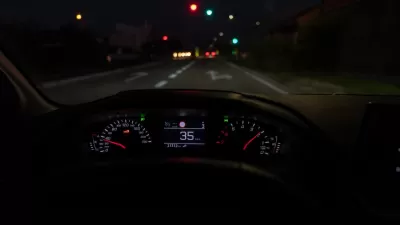Better Cities & Towns gives its imprimatur to the "narrower is better" approach to lane width for traffic safety thanks to a study by Toronto transportation planner, Dewan Masud Karim, presented at the Canadian ITE annual conference.

"Another study recently published supports 10-foot travel lanes over the 12-foot common practice on medium- and high-volume urban thoroughfares," writes Robert Steuteville, editor and executive director of Better Cities & Towns. "Planner and Walkable City author Jeff Speck wrote an article [posted here] last fall stating that state DOTs and county road commissions 'have blood on their hands' for building over-wide lanes in urban areas."
"The evidence cited by Speck on the safety hazards of wider lanes is powerful, though to date it remains pretty scarce," writes Eric Jaffe in CityLab. The evidence just got thicker thanks to Dewan Masud Karim, a senior transportation planner in Toronto and adjunct lecturer at Metro College of Technology, Toronto.
Karim looked at lanes in Toronto and Tokyo, specifically at crash data associated at randomly chosen intersections. He "found that collision rates escalate as lane widths exceed about 10.5 feet," wrote Planetizen blogger Todd Litman on the study in June, prior to its presentation to the Canadian Institute of Transportation Engineers' annual conference.
Steuteville adds that "Chris McCahill of the State Smart Transportation Initiative summarizes the new study in this way:"
Side impact- and turn-related crash rates are lowest at intersections where average lane widths are between 10 and 10.5 feet...This challenges the long-held, but often disputed, assumption that wider lanes are safer.
According to a 2010 study published in the ITE Journal, six states require a minimum of 12-foot lanes and another 24 states require 11-foot lanes.
"The latest research clearly shows that 10-foot lanes are worth fighting for on major urban thoroughfares," concludes Steuteville.
Toronto has since embarked on a program to narrow lane widths, in part due to Speck's earlier work, notes Planetizen managing editor James Brasuell.
Hat tip: Len Conly, Sierra Club Green Transportation listserv.
FULL STORY: Over-wide streets? You may regret it

Study: Maui’s Plan to Convert Vacation Rentals to Long-Term Housing Could Cause Nearly $1 Billion Economic Loss
The plan would reduce visitor accommodation by 25,% resulting in 1,900 jobs lost.

North Texas Transit Leaders Tout Benefits of TOD for Growing Region
At a summit focused on transit-oriented development, policymakers discussed how North Texas’ expanded light rail system can serve as a tool for economic growth.

Using Old Oil and Gas Wells for Green Energy Storage
Penn State researchers have found that repurposing abandoned oil and gas wells for geothermal-assisted compressed-air energy storage can boost efficiency, reduce environmental risks, and support clean energy and job transitions.

Private Donations Propel Early Restoration of Palisades Playground
Los Angeles has secured over $1.3 million in private funding to restore the Pacific Palisades playground months ahead of schedule, creating a modern, accessible space that supports community healing after recent wildfires.

From Blight to Benefit: Early Results From California’s Equitable Cleanup Program
The Equitable Community Revitalization Grant (ECRG) program is reshaping brownfield redevelopment by prioritizing projects in low-income and environmental justice communities, emphasizing equity, transparency, and community benefits.

Planting Relief: Tackling Las Vegas Heat One Tree at a Time
Nevada Plants, a Las Vegas-based nonprofit, is combating the city’s extreme urban heat by giving away trees to residents in underserved neighborhoods, promoting shade, sustainability, and community health.
Urban Design for Planners 1: Software Tools
This six-course series explores essential urban design concepts using open source software and equips planners with the tools they need to participate fully in the urban design process.
Planning for Universal Design
Learn the tools for implementing Universal Design in planning regulations.
Ascent Environmental
Borough of Carlisle
Institute for Housing and Urban Development Studies (IHS)
City of Grandview
Harvard GSD Executive Education
Toledo-Lucas County Plan Commissions
Salt Lake City
NYU Wagner Graduate School of Public Service




























